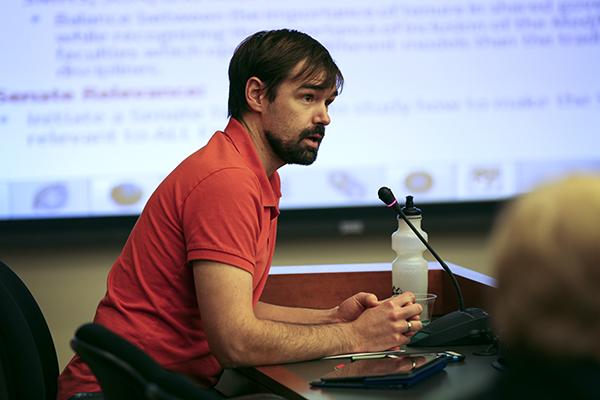Updated: Nov. 19, 2015 at 8:44 a.m.
Some faculty members are asking for a review of their own senate.
During last week’s Faculty Senate meeting, Charles Garris, the chair of the Faculty Senate’s executive committee, suggested the senate create a committee of members to examine how the faculty’s decision-making body works and how to make it more transparent. Faculty members said a re-evaluation might help to improve inclusion in the group, which remains limited to tenured or tenure-track faculty.
A resolution that would include non-tenured faculty in the Faculty Senate failed during a full-faculty assembly last week. A simple majority of faculty voted in favor of the resolution, but the measure needed two-thirds of the vote to pass.
This call to action comes after low overall turnout at the all-faculty meeting to determine non-tenured faculty’s future participation in the senate and high participation by health-related schools, and the failure of the resolution to extend participation.
“We ought to initiate a senate task force to do a study going around to departments throughout the University to find out how relevant the senate is to what they’re doing in those departments and how to make it more relevant,” Garris said during the meeting. “The data from Faculty Assembly is an eye-opener.”
The proposed committee, which would be made up of faculty members, would decide how to make the Faculty Senate’s work more visible to other faculty members and more relevant as a whole.
History professor Benjamin Hopkins said at the meeting that the senate should “stop being retractive and start being proactive” when including faculty who do not have the ability to serve on Faculty Senate in work they do by making sure they feel welcome to serve on committees.
“We need to be transparent in the eyes of all faculty members. There should be a legitimate process leading to a faculty-led discussion,” Hopkins said. “We really take the lead in this conversation.”
The Faculty Senate has in the past created task forces made up of senate members on other faculty issues like employee benefits. Other committees exist within the senate on topics like research and athletics, and faculty without tenure are permitted to participate.
Hopkins added that the current process for all-faculty participation through the annual Faculty Assembly, which is open to anyone at any level of faculty at GW, is not as fair as it could be because anything voted on by the assembly has been written and put on the ballot by the Faculty Senate.
Some members said it would be more beneficial for schools to individually evaluate how they extend membership to the Faculty Senate to faculty members of their schools so they could fairly represent the number of tenured and non-tenured faculty.
International Affairs professor Gregg Brazinsky said during Friday’s meeting that schools should make their own rules because faculty in every school can better gauge who represents them, rather than the Faculty Senate making exceptions for certain schools.
“Part of the process of rethinking the issue of what needs to go on – all faculty can have a thorough debate,” Brazinsky said.
After high turnout of faculty from the Milken Institute School of Public Health, the School of Medicine and Health Sciences, and the School of Nursing at last week’s meeting, Anton Sidawy, a professor in the medical school, proposed that the senate grant an exception to those schools.
Twenty-three percent of faculty from across the University participated in last week’s assembly. The public health school had the highest percentage of faculty with about 60 percent of faculty members taking part.
“I’m flabbergasted by the number of faculty from health schools that showed up,” Sidawy said. “Their place in our senate is not really representing the full-time faculty in our school.”
Harald Griesshammer, an associate physics professor and a member of the senate, said in an interview that faculty should take their time in proposing how to involve more faculty. He added that there should be a “faculty-driven” process to broaden participation.
“Nobody came out a winner. Everybody got a black eye at this Faculty Assembly,” Griesshammer said. “We have more than the nine months it takes to produce a baby until we can come up with something reasonable.”
This post was updated to reflect the following correction:
The Hatchet incorrectly identified Anton Sidawy as Arthur Sidawy. We regret this error.







